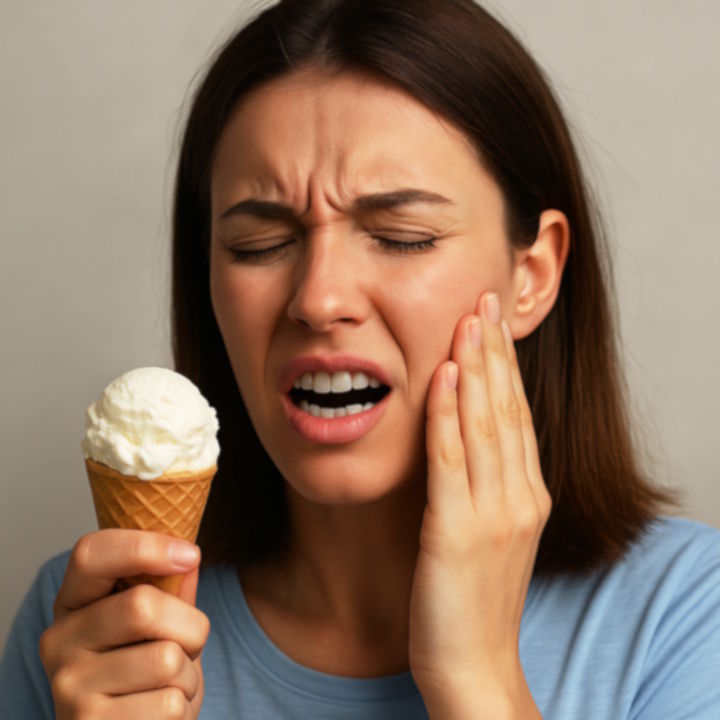
Why Are My Teeth So Sensitive?

Understanding Dentin Hypersensitivity and What You Can Do About It
Do your teeth cringe at the thought of ice cream or hot coffee? If that quick jolt of discomfort sounds familiar, you’re not alone. Millions of adults live with hypersensitive teeth -- and not the emotional kind. We’re talking about that sharp, zapping pain triggered by hot or cold foods, sweet treats, acidic drinks, or even just brushing too hard.
This type of discomfort often comes from a condition known as dentin hypersensitivity.
What Is Dentin and Why Does It Hurt?
Dentin is the middle layer of your tooth, the part that lies beneath the outer enamel and above the inner pulp. It’s packed with tiny tubules that connect to your tooth’s nerves. When dentin is exposed, those tubules act like little channels, allowing stimuli like heat or cold to reach the nerves directly. That’s what causes the pain.
Normally, enamel protects dentin. But when enamel wears away or gums recede, dentin becomes vulnerable to everyday triggers.
What Causes Tooth Sensitivity?
A few things can contribute to enamel loss or gum recession. Some are lifestyle habits, while others develop over time:
- Aggressive brushing: Using a hard-bristled brush or applying too much pressure can wear down enamel and irritate your gums.
- Acidic foods and drinks: Citrus fruits, soda, vinegar, and even tomatoes can weaken enamel when consumed frequently.
- Gum disease: Inflammation from plaque buildup can lead to gum recession, exposing dentin at the root.
- Bruxism: Clenching or grinding your teeth, especially during sleep, can gradually damage enamel and cause tiny fractures.
- Poor oral hygiene: Skipping flossing or brushing less often allows plaque and bacteria to weaken enamel and inflame gums.
- Habits like nail biting or chewing ice: These put unnecessary stress on enamel and can chip or thin tooth surfaces.
Even over-the-counter whitening toothpastes can sometimes trigger sensitivity, especially if they contain harsh abrasives or bleaching agents.
How to Ease Tooth Sensitivity at Home
If your teeth already feel a little too reactive, the good news is there are some simple changes you can make:
- Switch to a soft-bristled toothbrush and use light pressure when brushing.
- Try a toothpaste for sensitive teeth. These contain ingredients that block nerve signals or strengthen enamel. Relief can begin after just a few uses.
- Avoid overly hot or cold food and drinks, especially if you notice sharp pain.
- Limit acidic items in your diet and rinse with water after consuming them.
- Brush gently but thoroughly, twice a day, and don’t skip flossing. Keeping gums healthy helps prevent further exposure of the dentin layer.
When to Talk With Your Dentist
If the pain sticks around or worsens, it’s time to schedule a visit. In some cases, tooth sensitivity can signal more serious concerns like tooth decay, cracks, or progressing gum disease. Your dentist may recommend options like fluoride treatments, bonding agents to seal exposed areas, or in more advanced cases, a protective crown.
The key is early attention. The sooner the cause is identified, the easier it is to prevent lasting damage and feel comfortable again.
Your Next Step
Sensitive teeth can be frustrating, but they don’t have to get in the way of your favorite foods or daily routine. With the right approach, you can calm that sting and protect your smile for the long haul.
Dealing With Tooth Sensitivity?
We’re here to help you find the source and relief that lasts. Book a visit or give us a call to get started on a plan that works for you.
Feel more confident and show off a beautiful, brand new smile. Zoom teeth whitening in Miami helps patients look younger and more refreshed. Call our office today at 305-894-3083 if you want to learn more about professional whitening.


